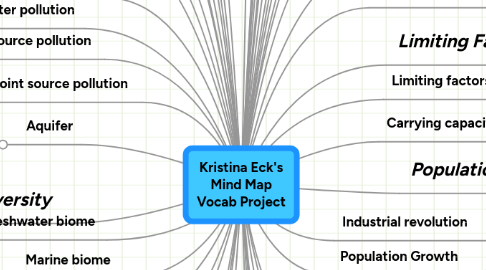Kristina Eck's Mind Map Vocab Project
by Kristina E

1. Vocab words through out the course of Ecology
2. Organism
2.1. Any form of life
3. Population
3.1. Total number of people in an area
4. Community
4.1. Populations that interact together in an ecosystem
5. Ecosystem
5.1. Living organisms that work together as one unit in a non-living enviornment
6. Biome
6.1. Region of Earth inhabited by a community
7. Biosphere
7.1. Layer of soil, water, and air that sustains life.
8. Tropic Levels
8.1. A group of organisms that occupy the same position in a food chain
9. Rainforest
9.1. Forests with heavy annual rainfall
10. Temperate deciduous forest
10.1. A forest with trees that purposely lose their leaves just to grow them back again later
11. Coniferous Forest
11.1. Forests with mostly cone-bearing trees
12. Desert
12.1. An area with little rain fall and mostly no vegetation.
13. Grassland/Savannah
13.1. Land where grass or grasslike vegetation grows. Savanna is flat grassland.
14. Freshwater biome
14.1. Having low salt concentration
15. Marine biome
15.1. Salty bodies of water
16. Biotic factors
16.1. An ecosystem of all living things.
17. Abiotic factors
17.1. An ecosystem of non-living things
18. Tundra
18.1. A vast treeless plain in the Arctic regions where subsoil is permanently frozen.
19. Water pollution
19.1. The addition of harmful chemicals in natural water
20. Point-source pollution
20.1. Pollution that comes from a single source
21. Non-point source pollution
21.1. water pollution that does't come from a single source, but from many different sources
22. Aquifer
22.1. An underground bed or layer yielding ground water for wells and springs. ect.
23. Water Pollution
24. Biodiversity
25. Biotic/Abiotic
26. Levels of Organization
27. Industrial revolution
27.1. The transformation from an agricultural to industrial nation
28. Population Growth
28.1. Increase in the number of people in a territory or state
29. Carrying capacity
29.1. The number of individuals of a species that an ecosystem can support.
30. Climax community
30.1. A community that's in equilibrium and has little or no change in species in the following years
31. Logistic growth
31.1. Population growth rate decreases and number of individuals increases until growth rate reaches 0 and population reaches its maximum.
32. Sustainability
32.1. Expansion in duration or space
33. Exponential growth
33.1. When the population doubles
34. Population growth rate
34.1. The change in population over time
35. S-curve
35.1. Exponential growth
36. J-curve
36.1. Logistic growth
37. Pioneer species
37.1. The first species to move into an ecosystem.
38. Food Chain
38.1. A chain of organisms that each eachother
39. Food Web
39.1. Many food chains put together to make a web
40. Primary Consumer
40.1. A herbavore which eats plants
41. Secondary Consumer
41.1. A carnivore which eats meat
42. Tertiary Consumer
42.1. A carnivore at the top most level of the food chain
43. Producers
43.1. Organisms that produce their own energy from the sun
44. Biodiversity
44.1. The number and variety of organisms in a geographic region.
45. Hot spots
45.1. Really diverse spots on the earth near the equator
46. Limiting factors
46.1. Conditions of the enviornment that limit the growth of a species.
47. Black plague
47.1. The bubonic plague that happened during the middle ages and killed half the people in western Europe
48. Ecological succession
48.1. the process in which communities of an ecosystem change over time
49. Primary succession
49.1. Occurs in places where an ecosystem has never existed and there is no soil
50. Secondary succession
50.1. Process that begins in an ecosystem when something has disturbed or destroyed the natural community and has just soil.
51. Population
52. Limiting Factors
53. Biodiversity
54. Food Webs


